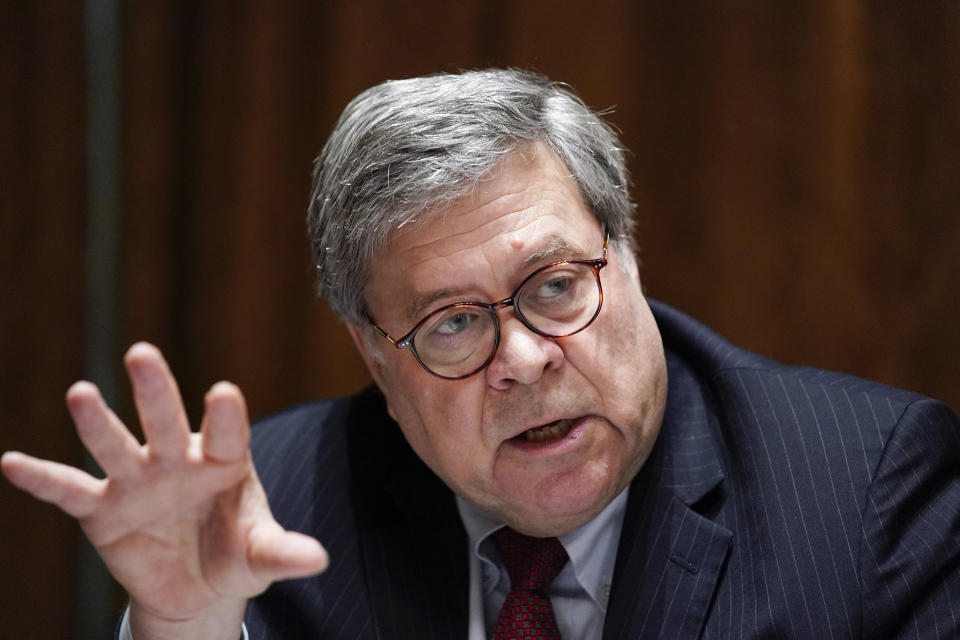Geoffrey Berman, U.S. attorney fired by Trump, twice refused to resign
WASHINGTON — Geoffrey Berman, the former U.S. attorney for the Southern District of New York, on Thursday described a pressure campaign led by Attorney General William Barr to get him to leave his post as one of the nation's most powerful federal prosecutors.
Berman detailed in closed-door testimony to the House Judiciary Committee some of the behind-the-scenes machinations that led to his unceremonious ouster last month. NBC News obtained a copy of the seven-page opening statement.
Berman said that in the 48 hours before he was fired, he refused to resign on two occasions, contrary to a statement the Justice Department released at the time, and that to get him to leave, the attorney general offered him several other high-profile jobs.
The attorney general's office did not respond to a request for comment. Barr will testify before a House Committee later this month, and he is likely to be asked about Berman's ouster.
Berman said a member of Barr's staff unexpectedly emailed him June 18 to schedule an afternoon meeting in New York. At the meeting the next day at a hotel, Barr, along with his chief of staff, Will Levy, informed Berman that he wanted to make changes at the Southern District.

To encourage his departure, Barr offered Berman a job in the Justice Department's Civil Division. He also said Barr was not dissatisfied with his performance.
"I told the attorney general that I was not interested in overseeing DOJ's Civil Division or in resigning," Berman said in his opening statement. "I said that I would leave whenever a nominee is confirmed by the Senate, as set forth in the statute under which I was appointed."
Berman's sudden departure last month, which shocked and confused legal observers, created a political maelstrom in Washington because he was overseeing the investigation of the business activities of President Donald Trump's personal lawyer Rudy Giuliani.
Berman's office prosecuted two Florida businessmen, Lev Parnas and Igor Fruman, former Giuliani associates tied to the Ukraine impeachment investigation, who were accused of violating federal campaign finance laws. The office also prosecuted former Trump confidant Michael Cohen, although Berman was not involved in the case.
In his closed-door interview with the Judiciary Committee, Berman would not go into details about the investigations, both Republican and Democrats who attended the meeting said.
Berman said that even after he refused to resign, Barr continued to press him to step down. He said Barr told him that his departure was being requested because the administration wanted Jay Clayton, the chairman of the Securities and Exchange Commission, in his position as a way to "keep him on the team."
"I told the attorney general that I knew and liked Jay Clayton but he was an unqualified choice for U.S. attorney for the Southern District of New York because he was never an AUSA [assistant U.S. attorney] and had no criminal experience," Berman said in his statement.
Barr then offered him the job of SEC chairman, Berman said.
"I said that there was no job offer that would entice me to resign from my position," Berman said.
When he refused to step down, Barr told him that he would be fired, a move that "would not be good for my résumé or future job prospects," Berman said.
"I told the attorney general that there were important investigations in the office that I wanted to see through to completion. I also said that I wanted to help lead the office through the COVID crisis and get the office back to normal functioning," Berman said.
The 24 hours after the meeting put the Justice Department at loggerheads with one of its most prestigious U.S. attorney's offices. Berman said in his statement that he immediately contacted his private lawyers and executive staff to discuss challenging a firing in court.
That night, the Justice Department issued a release claiming that Berman had resigned, only hours after Berman had again refused to resign in a brief phone call with Barr, he told the House panel in his statement. Berman issued his own release, denying that he had resigned.
Word of Barr's announcement caught senior officials in the Manhattan U.S. attorney's office off guard. Barr initially tapped Craig Carpenito, the U.S. attorney in New Jersey, to serve as acting U.S. attorney in Manhattan, but the plan was scuttled after Berman's public refusal to step down.
Barr then released a letter June 20 addressed to Berman stating that Trump had fired him, but Berman said the letter "contained a critical concession."
"The attorney general stated that Audrey Strauss, my hand-picked and trusted deputy, and not Craig Carpenito, would be acting U.S. attorney and was expected to serve in that capacity until a permanent successor is in place," Berman said in his testimony. "With that concession, and having full confidence that Audrey would continue the important work of the office, I decided to step down and not litigate my removal."
Leigh Ann Caldwelll reported from Washington, and Dartunorro Clark from New York.

